Before reading the following lines, I would like to invite you to go to Youtube and listen to the immortal song “Mông mơ” (Reverie) by the famous German composer R. Schumann (1810-1856) with Vietnamese lyrics by Pham Duy, performed by singer Le Thu. “Sitting still, looking up at the garden of stars flickering with worry... The old people... knowing their fate is short, still have not forgotten their casual love...”
Decades ago, when she was a middle school student, a little girl from Mai Xa village (Quang Tri) happened to hear the artists discussing the song "Dream". At that time, she followed her father, teacher Truong Quang De, to Hanoi to study, temporarily staying in the Central Arts dormitory. Her love for classical music was planted from there and although she did not have a single hour of music lessons, until now she has become a grandmother, the "old" girl has just taken readers on a "tour" of the world's classical music garden through the very interesting book "My Musical Tour" (Vietnamese Women's Publishing House, 2024), in which chapter 10 is titled "Schumann - Clara - Brahms: Forever a Love" - a "love triangle" that is perhaps the most magical in the world.
Cover of the book “My Musical Walk”
Love is an eternal theme that is always new in literature and art. You will see that when reading this work. A book about music devotes many pages to a love story of a "love triangle" because the author also... loves the pianist Clara (1819-1896) as he confessed: "I love and admire her because she is the inspiration for Schumann's compositions. Sometimes I dare to think that if it were not for Clara, humanity today would not have enjoyed so many good pieces of music by Schumann... It has been proven that: "Behind the success of a man there is always the shadow of a woman"...".
In Schumann's life, Clara was not just a "shadow" behind her husband. From a young age, Clara was famous as a child prodigy; "her name resounded throughout Europe through tours when she was only 9 years old...". After seeing her perform, the poet Goethe commented: "This girl has more extraordinary strength in her hands than six boys combined." In her sixty years of artistic activities, she performed for the public 1,300 times! Such a talent sacrificed everything for Schumann, although her parents objected because they were worried that if their daughter married a talent like Schumann, Clara's musical career would be ruined.
However, on the contrary, because of her love for Schumann and also for music, Clara's name became more and more admired by the world. When Schumann's hands could no longer play the piano, "it was she who played his music, while he withdrew to concentrate on composing. Miraculously, this was the most brilliant period of his composition."
Brahms' love for Clara was also very special. In 1853, the young Brahms came to Schumann's house, asking to play a Sonata that he had just composed. After listening, Schumann immediately told his wife that he would definitely become a genius! And it was true, just a short time later, Brahms became a composer, a talented pianist and conductor of Germany. With such a special relationship, but "because of her steadfast love for her husband, she resolutely rejected Brahms - who had always given her all his love... Brahms' love for Clara was pure love, devotion, selfless, undemanding... Perhaps that pure love helped him compose music that captivated and touched the hearts of listeners...".
When Schumann was in the hospital for 2 years before his death, Brahms took care of the children so that Clara could go on tour; and after Schumann and his 4 children passed away, "it was Brahms who supported her, helped her overcome the pain... continued to enjoy life and returned to performing...". It is truly miraculous that for 40 years after Schumann's death (1856 - 1896), Clara was able to live and work in music thanks to the pure love of Brahms! That's not all, when Clara's right hand hurt and she had to temporarily stop playing the piano, Brahms arranged a famous song by JSBach to the piano for the left hand so that Clara would not have to leave the piano. Moreover, when arthritis prevented Clara's hands from playing complex pieces, Brahms composed simpler works for her...
The book of over 300 pages covers the lives and careers of 15 of the world's most talented musicians - from Chopin, Tchaikovsky, Beethoven, Bach. Mozart to Schumann, Schubert..., but with just this special "love triangle" story, readers can imagine how rich and multi-dimensional the book is. And with just this story, the author has helped readers understand more about the beautiful love of women as the source and motivation for creating timeless literary and artistic works.
Interestingly, it can be said that the book was born thanks to another "love triangle" - the love of French literature doctor Anna Na for music and the quintessence of human culture. Of course, if she did not have such a passionate love for music like Anna, she would not have been able to write this book - whether in Hue, Ho Chi Minh City or Paris, in her free time, she would go to cafes to listen to classical music; she has seen the play "The Chestnut Double" 7 times, since this ballet by Tchaikovsky was staged in Ho Chi Minh City in 2011... But to have a loyal love for this genre of music considered "high-class", Anna has a priceless "support" which is living in an atmosphere full of love for both Western and Eastern cultural values. That is the exemplary family of teachers from Mai Xa village. Let me quote an article by French teacher and expert Truong Quang De, who, while searching for the "origin" of the famous singer Tan Nhan, for the first time "revealed" the life of his father - the Chairman of Quang Tri province since 1948, when he was only respected by the people in the area with the name "Mr. Tro Phien":
“...Mr. Tro Phien was a teacher with special pedagogical talent. His Tien Viet school was a training ground for knowledge, aspirations, and artistic skills. Outside of class, students practiced acting in all kinds of plays: reformed opera, opera, and spoken drama. Students also practiced giving speeches in monthly clubs and played sports on beautiful afternoons on the windy hill along the river. Mr. Phien's mark was so profound that his former students, who are now of a rare age, still remember and can recite by heart the math, history, science, French poetry, Nom poetry, and Chinese poetry that Mr. Tro Phien taught in the 1930s. It is hard to imagine that in those distant years, Mr. Tro Phien had a library full of books, including banned books. He also ordered all kinds of newspapers published in Hanoi, Saigon, and Hue. That very book room, both public and banned books (De Tham, Cao Thang, Bai Say...) contributed to creating the personality of singer Tan Nhan...”.
And of course, the French expert Truong Quang De and his daughter Truong Thi An Na became talented (directly or indirectly) from the rich, multi-dimensional "human furnace" of Mr. Tro Phien! That is why An Na wrote the following lines: "I see that art forms are not mutually exclusive, but they always exist side by side... I myself still enjoy reading books alternating between modern literature and classical literature... I listen to classical music but still love modern music of the 20th and 21st centuries...".
So I would like to call this a “love triangle”, and more because Anna has a “multi-dimensional, multi-voiced” love for literature and art. And the nature of life is also multi-voiced. Without her love for French literature, Anna would not have had the opportunity to access the world classical music collection published by the newspaper “The World” (Le Monde) in the early 21st century... Also because of that, readers who love French poetry and literature can read in this book specializing in classical music good poems translated by Anna. For example, here are some verses translated from Schumann’s lyrics that Anna thinks “have a very unique poetic color”. The song is titled: “In the magical month of May”:
“In the magical month of May / All the buds seem to burst forth / In my heart / Love blossoms / In the magical month of May / All the birds seem to sing...”
That's it! If you read this article and then read An Na's book, I hope you occasionally give your eyes a "break", turn on your phone, go to Youtube to listen to the famous classical music pieces that the author listed almost enough in the book and "forget" the impression that classical music is only for the "academic" world. Life, like art, is polyphonic! Just listen, listen many times and you will be... fascinated! For what? An Na answered you, after listening to Beethoven's immortal works: "...I have moments of satisfaction to immerse myself in each piece of music, to each melody with romantic emotions, joy, sadness, suffering, happiness, joy. There is one extremely precious thing that cannot be measured, that is, after all, I have realized everything more clearly, to love more, to cherish more the people, the lives around me!".
Nguyen Khac Phe
* “My musical walk” - Notes by Truong Thi An Na, Vietnamese Women Publishing House, 2024
Source: https://baoquangtri.vn/da-co-mot-moi-tinh-tay-ba-ky-dieu-nhu-the-189651.htm
































![[Photo] Gia Lai provincial leaders offer flowers at Uncle Ho's Monument with the ethnic groups of the Central Highlands](https://vphoto.vietnam.vn/thumb/1200x675/vietnam/resource/IMAGE/2025/7/9/196438801da24b3cb6158d0501984818)










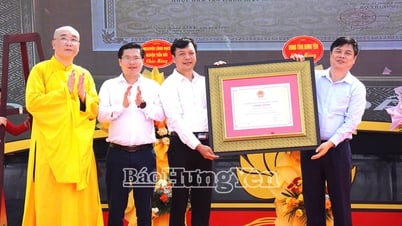



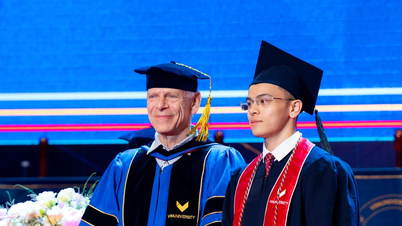




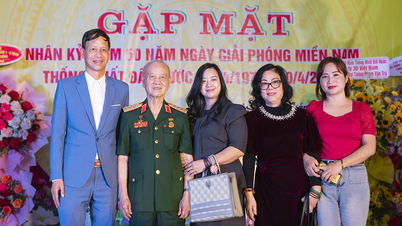

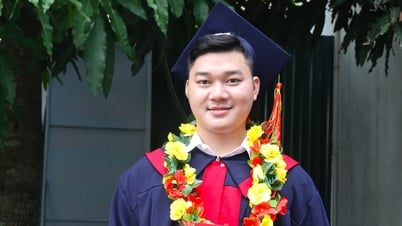












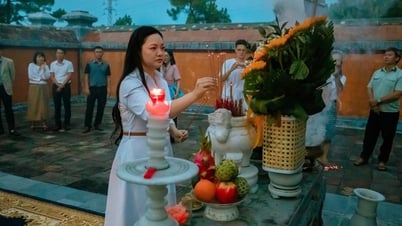






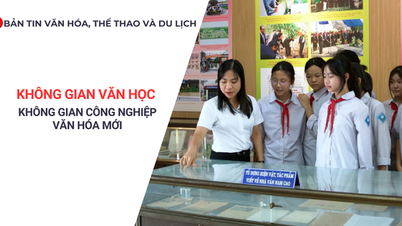





























Comment (0)